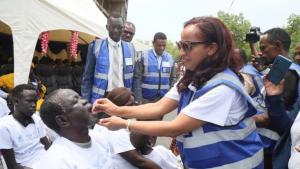Over 990 communities reached in Gambella’s cholera vaccine campaign
The Gambella region has successfully concluded a comprehensive Oral Cholera Vaccine (OCV) campaign, marking a critical milestone in the ongoing fight against the cholera outbreak that has impacted multiple districts.
Launched at the end of March, the campaign aimed to reach more than 990 communities, with strong coordination between federal and regional health authorities.
With the leadership of the Ethiopian Public Health Institute (EPHI) and collaboration of partners, the campaign was conducted successfully. Both the public and the vaccinators displayed commendable commitment.
Health Minister Dr. Mekdes Daba, alongside senior government officials, inaugurated the campaign, reaffirming the government’s commitment to halting the spread of cholera. In support of the initiative, 16 temporary cholera treatment centers were established in high-burden areas, and approximately 30 water tankers were deployed to address acute water shortages.
Since the outbreak’s onset in February 2025, a significant number of cholera cases have been reported across the country, with Gambella remaining one of the most affected regions. Under EPHI’s leadership, a coordinated response involving multi-sectoral stakeholders was launched. This included house-to-house disinfection, water testing and treatment, latrine construction, and risk communication and community engagement activities.
The OCV campaign was conducted in parallel with these interventions to interrupt transmission and bring the outbreak under control. Active case searches and strengthened case management also played a key role.
The World Health Organization (WHO) provided critical technical and operational support. WHO deployed rapid response teams to affected areas and delivered guidance on WaSH, risk communication, and clinical management. The organization also trained vaccinators based on WHO OCV standards and offered supportive supervision throughout the campaign.
WHO supported Ethiopia’s request for over 1 million vaccine doses through the International Coordination Group (ICG) on Vaccine Provision, backed by the Gavi Vaccine Alliance. It also supplied essential logistics and medical materials, benefiting more than 1,700 cholera patients. Additional efforts included hygiene promotion, the distribution of water treatment chemicals, and the installation of handwashing stations in vulnerable communities.
These comprehensive efforts were made possible through the financial support of the Central Emergency Response Fund (CERF), Japan Supplementary Budget (JSB), European Civil Protection and Humanitarian Aid Operations (ECHO), and Gavi, the Vaccine Alliance.
Dr. Abel Assefa Zugi, Head of the Gambella Regional Health Bureau, praised the response. “The intervention has already shown encouraging results, with a marked decline in severe cholera cases within just ten days of the campaign,” he said.
“This campaign demonstrates what can be achieved when national leadership, community engagement, and strong partner collaboration come together,” said Dr. Owen L. Kaluwa, WHO Representative to Ethiopia. “WHO remains committed to supporting Ethiopia’s efforts to prevent and respond to cholera outbreaks and to strengthen long-term health system resilience.”
Aligned with Ethiopia’s national cholera elimination strategy and the Global Roadmap to End Cholera by 2030, OCV campaigns in high-risk districts aim to stop transmission while laying the foundation for long-term water, sanitation, and hygiene improvements.
Cholera is an acute diarrheal illness caused by ingesting food or water contaminated with Vibrio cholerae. It can lead to severe dehydration and death if untreated, but early detection and fluid replacement therapy can effectively save lives.


